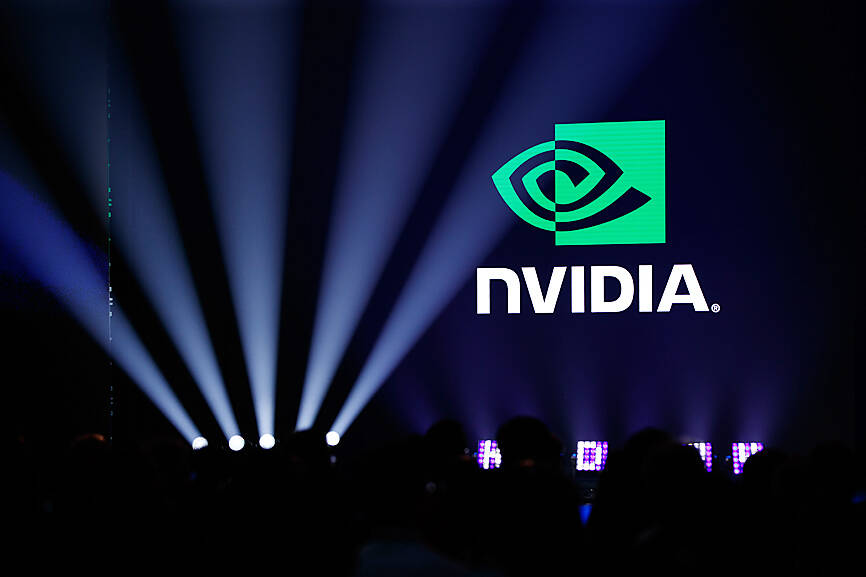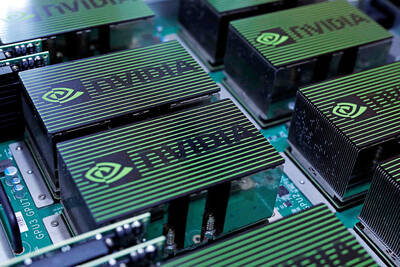Nvidia Corp led a surge in market value among global firms last month, buoyed by unrelenting demand for its new supercomputing artificial intelligence (AI) chips as more companies integrate AI into their daily operations.
Nvidia’s market cap rose 9.3 percent last month to US$3.26 trillion, while the company’s supplier, Taiwan Semiconductor Manufacturing Co (台積電), saw its market value increase 6.5 percent to US$832.8 billion. The gains came after the world’s largest contract chipmaker posted better-than-expected third-quarter earnings and gave a robust outlook for AI demand.
Apple Inc briefly ceded its top global market capitalization spot to Nvidia, with a 3 percent decline to US$3.4 trillion last month on a modest growth forecast and sluggish sales in China, before bouncing back.

Photo: Ritchie B. Tongo, EPA-EFE
The market values of Meta Platforms Inc and Microsoft Corp fell last month after both companies warned about escalating AI costs.
Mark Haefele, chief investment officer at UBS Global Wealth Management, maintained his positive outlook on AI, advising investors to use near-term volatility as an opportunity to increase exposure to quality AI stocks.
“We continue to favor select semi names and big tech, and we expect our AI portfolio to deliver 35 percent earnings growth in 2024 and 25 percent in 2025.”
In Asia, the market value of Tencent Holdings Ltd (騰訊) fell 9 percent to US$483 billion last month, carried by a wider decline in Chinese shares due to sluggish economic data, geopolitical tensions and as investors paused to assess government support measures.

Leading Taiwanese bicycle brands Giant Manufacturing Co (巨大機械) and Merida Industry Co (美利達工業) on Sunday said that they have adopted measures to mitigate the impact of the tariff policies of US President Donald Trump’s administration. The US announced at the beginning of this month that it would impose a 20 percent tariff on imported goods made in Taiwan, effective on Thursday last week. The tariff would be added to other pre-existing most-favored-nation duties and industry-specific trade remedy levy, which would bring the overall tariff on Taiwan-made bicycles to between 25.5 percent and 31 percent. However, Giant did not seem too perturbed by the

AI SERVER DEMAND: ‘Overall industry demand continues to outpace supply and we are expanding capacity to meet it,’ the company’s chief executive officer said Hon Hai Precision Industry Co (鴻海精密) yesterday reported that net profit last quarter rose 27 percent from the same quarter last year on the back of demand for cloud services and high-performance computing products. Net profit surged to NT$44.36 billion (US$1.48 billion) from NT$35.04 billion a year earlier. On a quarterly basis, net profit grew 5 percent from NT$42.1 billion. Earnings per share expanded to NT$3.19 from NT$2.53 a year earlier and NT$3.03 in the first quarter. However, a sharp appreciation of the New Taiwan dollar since early May has weighed on the company’s performance, Hon Hai chief financial officer David Huang (黃德才)

NVIDIA FACTOR: Shipments of AI servers powered by GB300 chips would undergo pilot runs this quarter, with small shipments possibly starting next quarter, it said Quanta Computer Inc (廣達), which supplies artificial intelligence (AI) servers powered by Nvidia Corp chips, yesterday said that AI servers are on track to account for 70 percent of its total server revenue this year, thanks to improved yield rates and a better learning curve for Nvidia’s GB300 chip-based servers. AI servers accounted for more than 60 percent of its total server revenue in the first half of this year, Quanta chief financial officer Elton Yang (楊俊烈) told an online conference. The company’s latest production learning curve of the AI servers powered by Nvidia’s GB200 chips has improved after overcoming key component

UNPRECEDENTED DEAL: The arrangement which also includes AMD risks invalidating the national security rationale for US export controls, an expert said Nvidia Corp and Advanced Micro Devices Inc (AMD) have agreed to pay 15 percent of their revenue from Chinese artificial intelligence (AI) chip sales to the US government in a deal to secure export licenses, an unusual arrangement that might unnerve both US companies and Beijing. Nvidia plans to share 15 percent of the revenue from sales of its H20 AI accelerator in China, a person familiar with the matter said. AMD is to deliver the same share from MI308 revenue, the person added, asking for anonymity to discuss internal deliberations. The arrangement reflects US President Donald Trump’s consistent effort to engineer